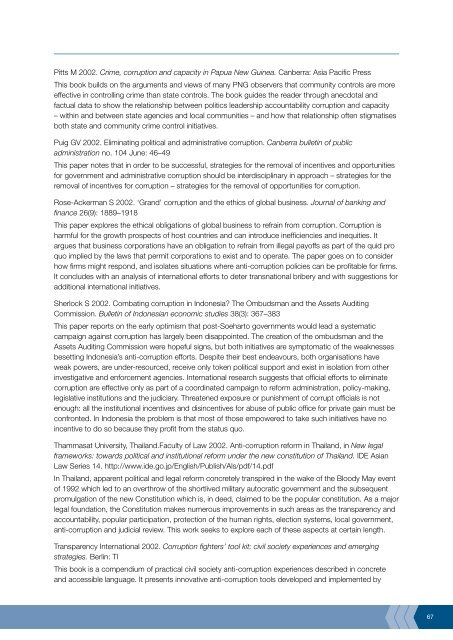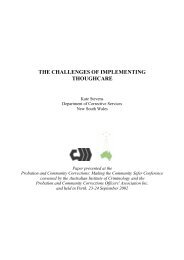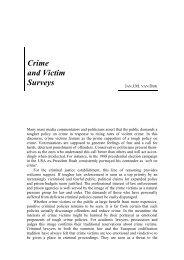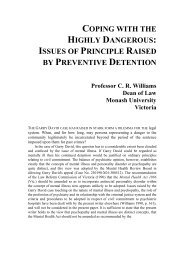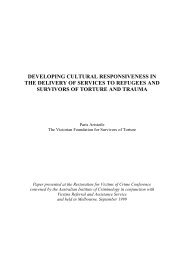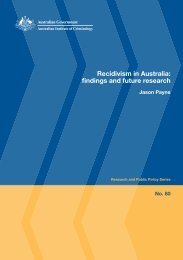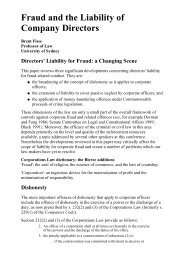Review of anti-corruption strategies Rob McCusker - Australian ...
Review of anti-corruption strategies Rob McCusker - Australian ...
Review of anti-corruption strategies Rob McCusker - Australian ...
Create successful ePaper yourself
Turn your PDF publications into a flip-book with our unique Google optimized e-Paper software.
Pitts M 2002. Crime, <strong>corruption</strong> and capacity in Papua New Guinea. Canberra: Asia Pacific Press<br />
This book builds on the arguments and views <strong>of</strong> many PNG observers that community controls are more<br />
effective in controlling crime than state controls. The book guides the reader through anecdotal and<br />
factual data to show the relationship between politics leadership accountability <strong>corruption</strong> and capacity<br />
– within and between state agencies and local communities – and how that relationship <strong>of</strong>ten stigmatises<br />
both state and community crime control initiatives.<br />
Puig GV 2002. Eliminating political and administrative <strong>corruption</strong>. Canberra bulletin <strong>of</strong> public<br />
administration no. 104 June: 46–49<br />
This paper notes that in order to be successful, <strong>strategies</strong> for the removal <strong>of</strong> incentives and opportunities<br />
for government and administrative <strong>corruption</strong> should be interdisciplinary in approach – <strong>strategies</strong> for the<br />
removal <strong>of</strong> incentives for <strong>corruption</strong> – <strong>strategies</strong> for the removal <strong>of</strong> opportunities for <strong>corruption</strong>.<br />
Rose-Ackerman S 2002. ‘Grand’ <strong>corruption</strong> and the ethics <strong>of</strong> global business. Journal <strong>of</strong> banking and<br />
finance 26(9): 1889–1918<br />
This paper explores the ethical obligations <strong>of</strong> global business to refrain from <strong>corruption</strong>. Corruption is<br />
harmful for the growth prospects <strong>of</strong> host countries and can introduce inefficiencies and inequities. It<br />
argues that business corporations have an obligation to refrain from illegal pay<strong>of</strong>fs as part <strong>of</strong> the quid pro<br />
quo implied by the laws that permit corporations to exist and to operate. The paper goes on to consider<br />
how firms might respond, and isolates situations where <strong>anti</strong>-<strong>corruption</strong> policies can be pr<strong>of</strong>itable for firms.<br />
It concludes with an analysis <strong>of</strong> international efforts to deter transnational bribery and with suggestions for<br />
additional international initiatives.<br />
Sherlock S 2002. Combating <strong>corruption</strong> in Indonesia? The Ombudsman and the Assets Auditing<br />
Commission. Bulletin <strong>of</strong> Indonesian economic studies 38(3): 367–383<br />
This paper reports on the early optimism that post-Soeharto governments would lead a systematic<br />
campaign against <strong>corruption</strong> has largely been disappointed. The creation <strong>of</strong> the ombudsman and the<br />
Assets Auditing Commission were hopeful signs, but both initiatives are symptomatic <strong>of</strong> the weaknesses<br />
besetting Indonesia’s <strong>anti</strong>-<strong>corruption</strong> efforts. Despite their best endeavours, both organisations have<br />
weak powers, are under-resourced, receive only token political support and exist in isolation from other<br />
investigative and enforcement agencies. International research suggests that <strong>of</strong>ficial efforts to eliminate<br />
<strong>corruption</strong> are effective only as part <strong>of</strong> a coordinated campaign to reform administration, policy-making,<br />
legislative institutions and the judiciary. Threatened exposure or punishment <strong>of</strong> corrupt <strong>of</strong>ficials is not<br />
enough: all the institutional incentives and disincentives for abuse <strong>of</strong> public <strong>of</strong>fice for private gain must be<br />
confronted. In Indonesia the problem is that most <strong>of</strong> those empowered to take such initiatives have no<br />
incentive to do so because they pr<strong>of</strong>it from the status quo.<br />
Thammasat University, Thailand.Faculty <strong>of</strong> Law 2002. Anti-<strong>corruption</strong> reform in Thailand, in New legal<br />
frameworks: towards political and institutional reform under the new constitution <strong>of</strong> Thailand. IDE Asian<br />
Law Series 14. http://www.ide.go.jp/English/Publish/Als/pdf/14.pdf<br />
In Thailand, apparent political and legal reform concretely transpired in the wake <strong>of</strong> the Bloody May event<br />
<strong>of</strong> 1992 which led to an overthrow <strong>of</strong> the shortlived military autocratic government and the subsequent<br />
promulgation <strong>of</strong> the new Constitution which is, in deed, claimed to be the popular constitution. As a major<br />
legal foundation, the Constitution makes numerous improvements in such areas as the transparency and<br />
accountability, popular participation, protection <strong>of</strong> the human rights, election systems, local government,<br />
<strong>anti</strong>-<strong>corruption</strong> and judicial review. This work seeks to explore each <strong>of</strong> these aspects at certain length.<br />
Transparency International 2002. Corruption fighters’ tool kit: civil society experiences and emerging<br />
<strong>strategies</strong>. Berlin: TI<br />
This book is a compendium <strong>of</strong> practical civil society <strong>anti</strong>-<strong>corruption</strong> experiences described in concrete<br />
and accessible language. It presents innovative <strong>anti</strong>-<strong>corruption</strong> tools developed and implemented by


